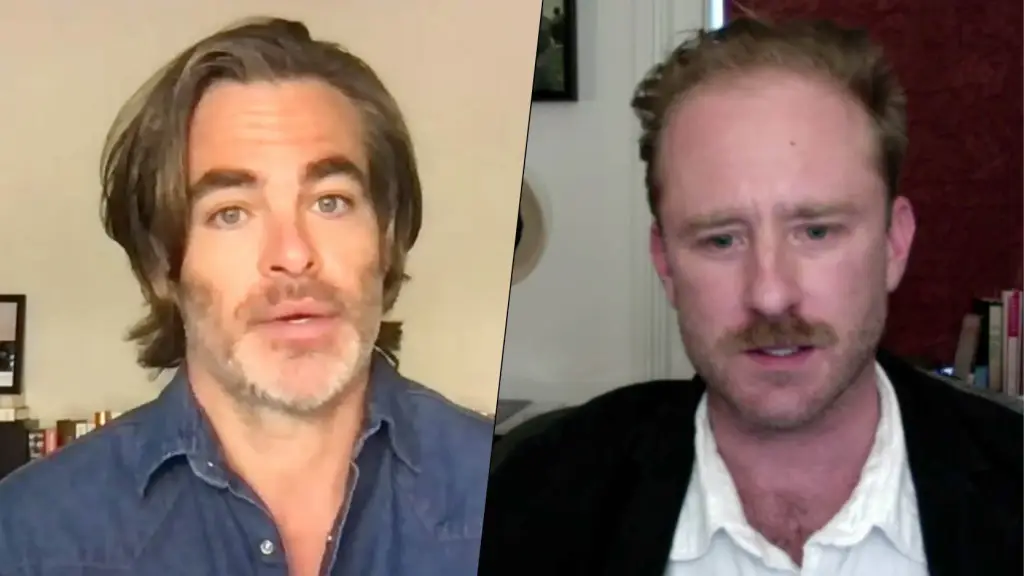Chris Pine and Ben Foster’s latest on-screen collaboration The Contractor is out today in theaters, on digital, and on demand. The thriller sees Pine as a former member of the military that winds up taking a job with a private military force after losing his pension.
“Chris Pine stars in the action-packed thriller as Special Forces Sergeant James Harper, who is involuntarily discharged from the Army and cut off from his pension,” says the official synopsis. “In debt, out of options, and desperate to provide for his family, Harper contracts with a private underground military force. When the very first assignment goes awry, the elite soldier finds himself hunted and on the run, caught in a dangerous conspiracy and fighting to stay alive long enough to get home and uncover the true motives of those who betrayed him. Also starring Kiefer Sutherland, Ben Foster, Gillian Jacobs, and Eddie Marsan.”
ComingSoon Editor-in-Chief Tyler Treese spoke to The Contractor stars Chris Pine and Ben Foster about the film, its underlying message, and more.
Tyler Treese: Chris, I thought this was a really interesting look at life after the military and just how it impacts family. There’s a lot of relatability within James and his traumatic upbringing and his desire to be a better parent. What did you find most compelling about the character?
Chris Pine: You kind of said in your question, on the surface, this is an action thriller. It certainly has those elements. It’s certainly genre specific. It’s kind of right down the middle, but within it is a very complex, I hope, character study of a returning veteran. This is a story about a man who was raised indoctrinated by very specific narratives, fictions, country honor, democracy, freedom-fighting, all of these things, and then they’re taken away from him. He’s then a man adrift without any structure, without anything to buoy him.
So he has to find something to latch onto and ultimately it comes down to family because it’s, ideological-less, it’s political bent-less, it’s just animal. This is very much about how we treat our veterans. It’s very much about the story of fathers and sons about the genealogy of violence, the history of violence, how we teach our young boys to go out into the world. So I hope people are pleased with the action and the thriller element but stay to really mull over the quinoa and veggies that are hidden in plain sight.
It’s definitely a real problem. Thankfully we have stuff like the Wounded Warrior project addressing issues like that.
Ben, you both starred in Hell or High Water together and you showed such great camaraderie in this film. Can you speak to just reuniting on screen and your chemistry as actors?
Ben Foster: It’s always more fun to go to work with people you dig and you care for. There’s nothing manufactured. I mean, you have to manufacture a lot of things, and what we do is one of those things that I don’t have to work out at all. With Chris, [there] is a feeling of ease, and that doesn’t mean not challenged. He’s an extraordinary actor, always looking to take risks, extremely intelligent, very intuitive, and kind. So earmuffs, but I mean, who wouldn’t want to go to work with someone like that?
Chris, the film doesn’t glamorize any aspects of war, which is always important, but I feel like doubly so with everything going on currently. When you are selecting your roles, how important is it that these projects have, you know, something significant for people to take away from it? You were mentioning that there is a lot of excitement in the action in the thriller, but there is a really serious subtext here.
Pine: It’s very important to me. I don’t think I could attach myself or commit violence on-screen now if it is not addressed the psychological and emotional impact of that violence. So, I think, say for maybe one moment in the film, I think all of the violence in this film, there is a reason behind it. You understand it, there’s something to mull over. There’s nuanced, moral complexity behind it. There’s psychological and emotional ramifications of it.
The fact that our primary seeming antagonist in the film, after he’s killed, your protagonist has to confront his son and his wife. It’s heavy, really deep shit. You have a father in James Harper and a husband, who’s loving and kind, I think, but then also in one pretty violent act kills a man. It’s really just not pretty, and it’s violent. I think it’s important for an audience to wrestle with the fact that they’re rooting for a man who wants to go home to his family, but in the meantime, has destroyed two families, and violently murdered another man. That’s your hero of the film. So I’m not making any comment on any of it really. I’m just a filmmaker trying to pose it as something to cogitate over.










